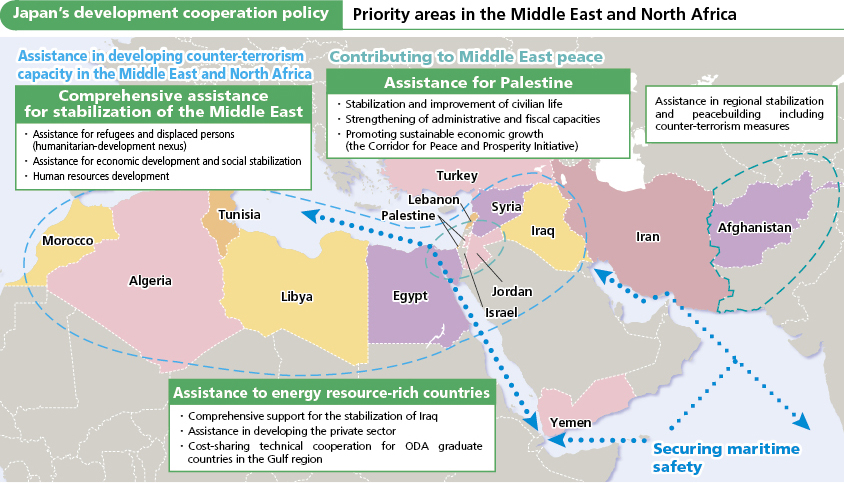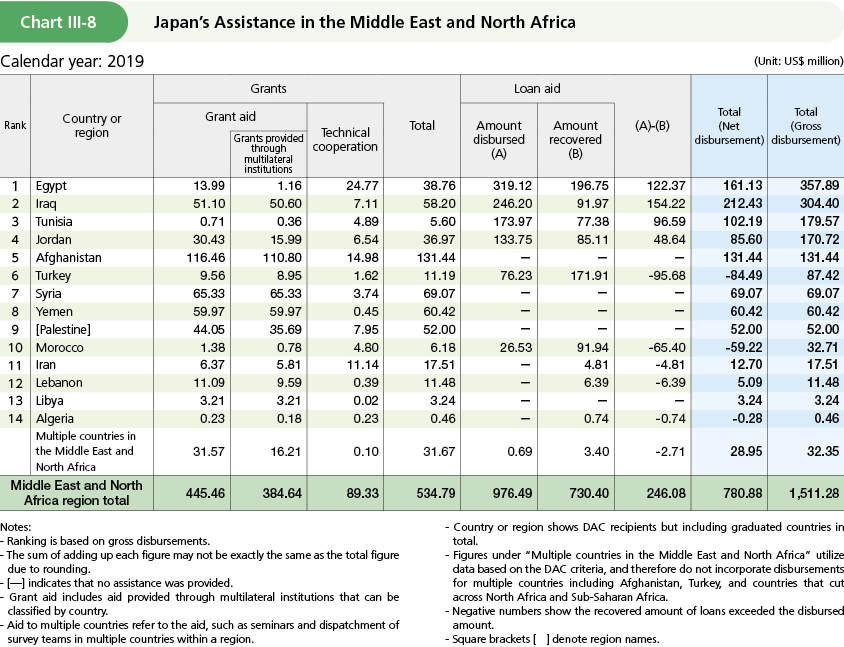7. Middle East and North Africa
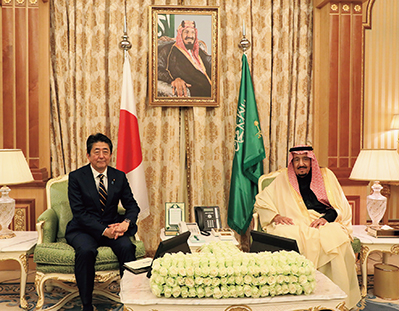
Then Prime Minister Abe holding a summit meeting with King Salman during his visit to Saudi Arabia (January 2020) (Photo: Cabinet Public Affairs Office of the Government of Japan)
Japan depends on the Middle East and North Africa region for approximately 90% of its crude oil imports, and the region, as a key point for global distribution, is critically important from the perspective of Japan’s economy and energy security. It is also a region with high potential and expectations for future growth due to its high rate of population increase, resulting in the expansion of the youth population.
At the same time, the region is facing wide-ranging issues such as Middle East peace, a historical issue dating back to the foundation of Israel in 1948, political turmoil in various areas since “the Arab Spring” that began in 2011, and heightened tensions surrounding Iran. In particular, conflict in Syria has been continuing and brought about a large number of refugees and internally displaced persons, seriously affecting the stability of the neighboring countries and the entire region at large. Furthermore, the risk of proliferation of violent extremism such as the Islamic State of Iraq and the Levant (ISIL) still remains in various areas. On the other hand, some changes to the current situation were seen in 2020. In the context of Middle East peace, the United Arab Emirates, Bahrain, Sudan, and Morocco have agreed to normalize diplomatic relations with Israel.
Realizing peace and stability in this region is extremely important for Japan as well as the international community as a whole, as it has significant impacts on both regional and global stability and prosperity. Thus, there is a need to provide support through such means as economic assistance and human resources development to achieve sustainable peace and stability in the region.
In 2020, Japan provided various assistance in response to COVID-19 based on the perspective of increasing medium to long-term resilience against infectious diseases and ensuring human security. Japan signed and exchanged notes with Egypt, Jordan, Morocco, and Tunisia for a total of ¥2.4 billion in grant aid for the provision of health and medical equipment. For Iran, where the spread of COVID-19 struck first in the Middle East, Japan provided approximately $27.5 million in emergency aid through international organizations for the response against COVID-19 in the country. Furthermore, since March 2020, Japan has provided approximately $8.91 million in emergency aid for Iraq through international organizations for support against COVID-19, including the provision of medical devices to refugee camps in Iraq and awareness-raising activities on infectious diseases prevention. For the response against COVID-19 in Lebanon, approximately $7.6 million in emergency aid was provided through international organizations, and Japan also assisted Lebanon through technical cooperation. Furthermore, cooperation projects conducted up until now across various Middle Eastern countries have seen results in assisting with countermeasures against COVID-19. In the Middle East, where instability due to conflict and other issues prevails, Japan will provide support in cooperation with the international community so that no one is left behind, based on the principle of human security.
●Japan’s Efforts
... Support for Syria, Iraq, Lebanon, and the neighboring countries
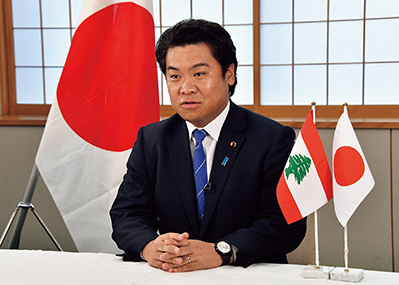
State Minister for Foreign Affairs Washio issuing a video message at the “International Conference in Support of the Lebanese People” held virtually (December 2020)
With regard to the Syria issue, which is a pressing concern for the international community, Japan announced the provision of assistance at the fourth Conference on Supporting the Future of Syria and the Region (Brussels Conference) held virtually in July 2020, and swiftly carried out the assistance totaling approximately $189 million. This assistance includes humanitarian aid and support for social stabilization for Syria and its surrounding countries. Furthermore, in March 2020, Japan decided to provide assistance of $4.75 million as support for shelter, blankets, and food supply for displaced persons and their host communities in northwest Syria where conflicts have intensified. In addition, in December 2020, Japan decided to provide a total of $7.2 million in humanitarian aid in the areas of water and sanitation and health, as well as the provision of food, clothing, and housing repair materials for winter mainly for the northwest area in response against the rapid spread of COVID-19 and abrupt deterioration of Syria’s social and economic situation.
As for Iraq, in addition to assistance via ODA loans for improvement of basic services such as water and electricity and human resources development through training programs, Japan has continued to provide grant aid through international organizations aimed at the early return and the resettlement of refugees and internally displaced persons, as well as the restoration of areas liberated from the control of ISIL in order to encourage the Iraqi government’s efforts toward reconstruction. In 2020, approximately $40 million in such aid was provided through international organizations.
With regard to Lebanon, Japan has provided over $220 million in humanitarian aid since 2012 to support refugees and their host communities. Furthermore, following the large-scale explosion at a port facility in Lebanon’s capital, Beirut, in August 2020, Japan provided emergency relief goods such as tents and blankets and $5 million in Emergency Grand Aid including for the repairs of damaged medical facilities. In addition, Japan provided approximately $1.2 million in grassroots-level emergency humanitarian aid through Japanese NGOs.
Since the outbreak of the Syrian crisis in 2011, Japan’s assistance to Syria, Iraq, and the neighboring countries has reached over approximately $2.9 billion. In these ways, Japan provides timely and effective assistance to the region despite the ever-changing humanitarian landscape (see also (1) Support for Peacebuilding and Refugees/Displaced Persons).
Japan also provides support for human resources development and self-reliance of refugees. At the G7 Ise-Shima Summit held in 2016, Japan announced that it would provide comprehensive assistance totaling approximately $6 billion for the Middle East in the three years between 2016 and 2018, including human resources development programs for approximately 20,000 people, in order to build a “tolerant and stable society” in the region, and has steadily implemented this assistance. As a part of this support, Japan decided to accept up to 150 Syrian students over five years to provide opportunities of education and foster human resources to contribute to Syria’s recovery in the future. In 2019, Japan accepted 22 Syrian students.
... Assistance to Yemen
Japan has provided assistance to Yemen as a major donor country and provided a total of approximately $256 million in support through international organizations over the five years from 2015 to 2019. In addition to funding assistance focused on humanitarian aid, Japan has also supported human resources development in order to back up Yemen’s self-reliant stabilization by accepting Yemeni students through Japanese government scholarship, conducting Japanese language training program for Yemeni diplomats and public officials as well as inviting Yemeni experts to Japan through JICA’s program.
... Assistance to Afghanistan
Japan has consistently contributed to Afghanistan’s reconstruction process since 2001, reaching a total of approximately $6.8 billion in assistance. As one of the major donor countries to Afghanistan, Japan has been endeavoring to coordinate its assistance with the Government of Afghanistan and other donors such as the G7, UN organizations, and the World Bank. In order to support Afghanistan’s efforts toward self-reliance and stability, Japan prioritizes capacity building of the police force in the security field, as well as agricultural and infrastructure development in the development field. Moreover, Japan also places particular importance on the areas of human resources development centered on government officials as well as health and education.
In 2012, Japan and Afghanistan jointly held the Tokyo Conference on Afghanistan to clarify the mutual commitment between Afghanistan and the international community for the sustainable development of the country. Japan, together with the international community, established the Tokyo Mutual Accountability Framework (TMAF) to regularly monitor and review the commitment. This framework has been succeeded under different names, and the Afghanistan Partnership Framework (APF) was adopted at the Afghanistan Conference in Geneva held virtually in November 2020. Foreign Minister Motegi issued a video message at the conference, stating that Japan will work on providing assistance from 2021 to 2024, maintaining an amount comparable to the past four years, which was $180 million annually, and is ready to consider additional support if progress is seen in the peace process.
... Middle East Peace (Assistance to Palestine)
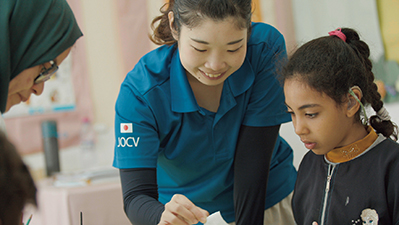
A Japan Overseas Cooperation Volunteer engaging in activities at the Nabeul branch of the Tunisian Association for Aid to the Deaf (Photo: JICA)
Japan has positioned its assistance to Palestine as one of the important pillars of its measures to contribute to Middle East peace and has provided more than $2.09 billion in assistance since the 1993 Oslo Accords. Specifically, Japan provides various types of humanitarian assistance through international organizations and NGOs to improve the severe living conditions of the socially vulnerable people in the West Bank including East Jerusalem, people affected by conflicts in the Gaza Strip, and others. Japan is also engaged in efforts aimed at preparing for the Palestinian nation-building in the future and for a self-sustained Palestinian economy, in order to stabilize and improve the people’s lives, strengthen the financial foundation, enhance the administrative and financial capacity, and promote economic self-reliance.
Since 2006, Japan has launched the initiative of the “Corridor for Peace and Prosperity” as its unique medium to long-term initiative that aims to promote socio-economic development in the Jordan Valley area through regional cooperation among Japan, Israel, Palestine, and Jordan, and is implementing the development of the Jericho Agro Industrial Park (JAIP) as the flagship project of the initiative. In May 2018, then Prime Minister Abe visited the JAIP during his visit to Palestine and received a briefing on the current conditions at the time from then Prime Minister Hamdallah of Palestine. At the same time, he also toured the exhibition booths set up by tenants operating in JAIP (as of October 2020, out of the 33 companies that have concluded tenancy contracts, 16 were in operation).
Furthermore, in 2013, Japan launched a new initiative called the “Conference on Cooperation among East Asian Countries for Palestinian Development (CEAPAD)” to help Palestine achieve economic independence by drawing on Asia’s experience on human resources development and corporate economic development. To date, meetings have been held on triangular cooperation for human resources development (see page 118, “South-South cooperation” under glossary) and on trade and investment expansion. Moreover, through these meetings, Japan plays an important role, such as by encouraging more countries to provide support for the United Nations Relief and Works Agency for Palestine Refugees in the Near East (UNRWA), which is responsible for assisting Palestinian refugees. In July 2019, with Palestine, Japan co-hosted the Senior Officials Meeting of the CEAPAD in Ramallah, Palestine, and the importance of incorporating the private sector’s vitality into the development of Palestine was reaffirmed. In addition, in September 2019, Foreign Minister Motegi attended the Ministerial Meeting on UNRWA held in New York and stated that Japan would provide a total of approximately $11 million in grant aid to support UNRWA for its assistance in education, sewage treatment, and food supply. Furthermore, due to the spread of COVID-19, ministerial conferences were held virtually three times in 2020 regarding support for UNRWA, which is responsible for providing basic services including health and medical care to approximately 5.6 million Palestinian refugees. The State Minister for Foreign Affairs Uto attended the Ministerial Strategic Dialogue in October and he contributed to the discussion on financial stabilization as one of the major donor countries.
Japan has steadily implemented such assistance and, in cooperation with the international community, will continue to provide support for social stabilization and inclusive growth, not only from the perspective of humanitarian assistance, but also a medium to long-term view. This includes assistance in human resources development that leverages on Japan’s strengths.
